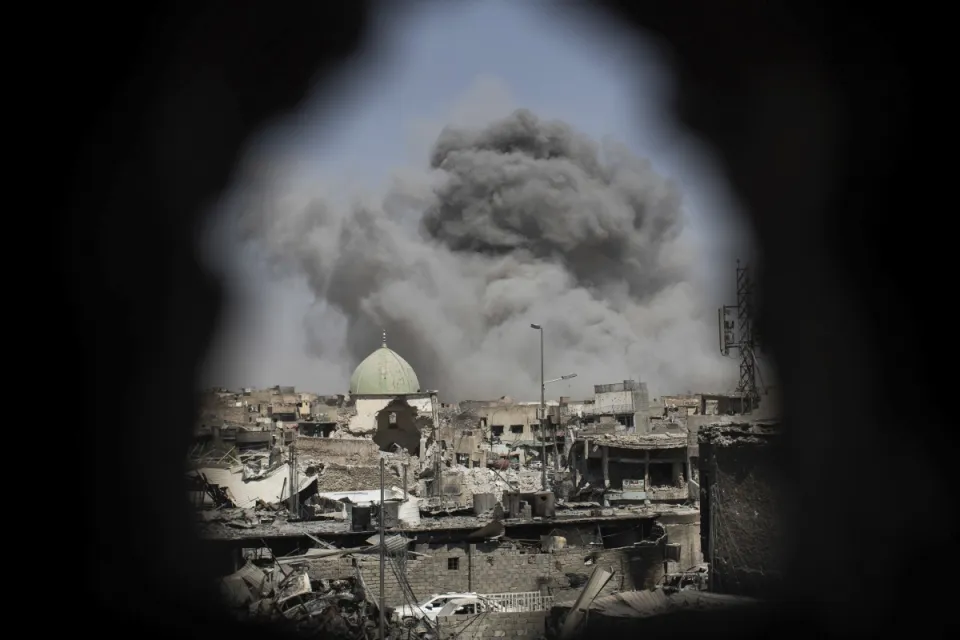By John Stapleton
The Iraqi government has announced the end of the caliphate after capturing the Al-Nuri Mosque in Western Mosul, the place where Islamic State leader Abu Bakr al-Baghdadi announced the formation of the caliphate and unleashed a reign of terror on the world.
“Their fictitious state has fallen,” an Iraqi military spokesman, Brigadier General Yahya Rasool, told Iraqi state television.
Only an estimated 350 Islamic State soldiers remain in an area of less than one square kilometre in the ancient city.
Experts warn that the brutal nature of the Mosul occupation is fuelling extremism around the world. While the exact numbers are concealed in the rubble of the ancient city, the mujahideen soldiers of Islamic State, civilians and Iraqi personnel have died in their many hundreds.
As streams of Sunni muslims flee from the pulverised ruins of their neighbourhoods they pass bodies rotting in the intense heat.
More than 860,000 people have fled the city since the Iraq Army, backed by Coalition airstrikes, including from Australia, began pounding the city last October.
Eight months of gruelling combat later Mosul, Iraq’s second largest city and encompassing the ancient Assyrian city of Nineveh, and whole districts of what the Bible refers to as the “Great City”, look like scenes from an apocalypse.
Back then, Army officers boasted it would be mere days before they retook the city where al-Baghdadi declared an Islamic Caliphate in 2014.
While some of the civilians being “liberated” from the city display gratitude, or ingratiate themselves with their new conquerors, it is clear from footage of the frontline that the civilian Sunni population are as terrified of the Coalition-backed Shias of the Iraqi Army as they may once have been of Islamic State.
Human Rights Watch says thousands of Sunni Muslims have been tortured, killed or disappeared.
There are numerous concerns over the behaviour of the conquering Iraq Army, which is backed by both America and Australia. Footage from French television shows officers laughing at dead Islamic State soldiers.
Belkis Wille, Senior Iraq Researcher with Human Rights Watch, told The New Daily the civilian population is “extremely traumatised”.
“The civilians are highly traumatised. Mosul is the largest urban war in modern history. The west of the city and the neighbourhood still under ISIS control are extremely densely populated,” she said.
“Every direction you look you have hundreds of civilians packed into buildings. People who come out don’t complain about the horrific three years under ISIS, they complain about the airstrike that killed their family, despite them having made it through those three years.
“People have lost entire families, their homes, their livelihoods. They are coming out with absolutely nothing.”
Ms Wille said the Iraqi Army had also perpetrated abuses against the Sunni minority with impunity – the exact same conditions which led to the formation of the Islamic State.
“This battle is going to have very negative long term consequences for the country. If it’s not ISIS today, then it’s ISIS 2.0 tomorrow.”
All sides talk of God, from the Islamic State ‘martyrs’ to the conquering army to the devastated civilians.
“I have lost five children, there is no God but Allah,” says one shellshocked woman as she stumbles across the frontline, recorded by French television.
Dr Clarke Jones, terror expert at the Australian National University, told The New Daily the Coalition might trumpet the fall of Mosul as a symbolic triumph over terrorism, but it had not made the world safer.
“Many can see that military conflict is a greater driver of militancy than the military victory itself,” he said.
“It is all very well for the West to say it has won against Mosul. The West forgetting the back channels of reporting of the death of innocent civilians.
“That has a far greater impact and is fuelling the ideology of Islamic State and the narrative of the persecution of Muslims.”
Martin Chulov, one of the world’s leading experts on Islamic State, told The New Daily: “The genie is out of the bottle in the sense that the virulent ideology that ISIS fosters by tapping into grievances of the disenfranchised – in their case ‘persecuted’ Sunnis – will be fed by their ousting.
“They have given up, for now, on controlling geography, in favour of controlling populations – through terror attacks abroad. These will continue, even after they are chased from their last strongholds in Syria.”
